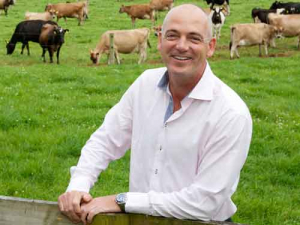Another Windfall for Fonterra Farmers, Unit Holders
Fonterra farmer shareholders and unit holders are in line for another payment in April.
 A notable disaster was the under-performance and over-the-top pay to former chief executive Theo Spierings.
A notable disaster was the under-performance and over-the-top pay to former chief executive Theo Spierings.
Finally, Fonterra has got something right. Well, the co-op’s director remuneration committee has.
In the notice of the dairy cooperative’s annual meeting, to be held at its Lichfield plant on November 8, a highlight is that Fonterra directors and shareholders’ council members will not be getting a pay rise this year.
Thankfully, the co-op’s director remuneration committee has recommended no change to board and council fees, as it should have. In fact, a call for a cut in remuneration would not have been out of order.
The past year has been a disaster for Fonterra. It reported a $196 million net loss last financial year; weaker global dairy prices have also forced the co-op to keep lowering its forecast payout for milk from an opening forecast of $7/kgMS in May to a $6.25 - $6.50 range earlier this month.
On top of this, the dairy company has stumbled during the year from one public disaster to another, rightly earning the continued criticism and ire of senior cabinet minister Shane Jones and his colleagues. Notable among the disasters were the under-performance and over-the-top pay to former chief executive Theo Spierings, and the financial disaster of its investment in Chinese infant formula company Beingmate.
Every one of the failures, fiascos and cock-ups has occurred on the watch of this Fonterra board and, to a lesser extent, this shareholders’ council. Frankly, they have all been asleep at the wheel. Yet only two directors have had the grace to step down – former chair John Wilson (mainly due to health issues) and Nicola Shadbolt.
The remuneration committee of six shareholders meets every year to set director and councillor fees. It reported to Fonterra shareholders, in the notice of annual meeting mailed out last week, that between 2014 and 2016 it recommended directors’ remuneration remain unchanged, “appropriate given the very challenging economic conditions experienced by shareholders”.
However, last year, it recommended increasing director fees. The chairman’s fee was lifted by $25,000 to $430,000; the directors’ fees went up by $10,000 to $175,000.
At the time, the remuneration committee said it’s important to set “realistic fee levels” to ensure “highly skilled directors are attracted and retained”.
Fonterra shareholders may now rightly question just how ‘highly skilled’ their directors have been during the past year.
It is past time all the co-op’s directors paid the price of their collective failures.
Fruit trader Seeka posted a record profit and returns to shareholders in 2025.
Recent weather events in the Bay of Plenty, Gisborne/Tairawhiti, and Canterbury have been declared a medium-scale adverse event.
DairyNZ's chief executive Campbell Parker says the 2024/25 dairy season reinforces the importance of the dairy sector to New Zealand.
A New Zealand agribusiness helping to turn a long-standing animal welfare and waste issue into a high-value protein stream has won the Australian dairy sector's top innovator award.
OPINION: A bumper season all around.
Dairy Women's Network (DWN) has announced that Taranaki dairy farmer Nicola Bryant will join its Trust Board as an Associate Trustee.